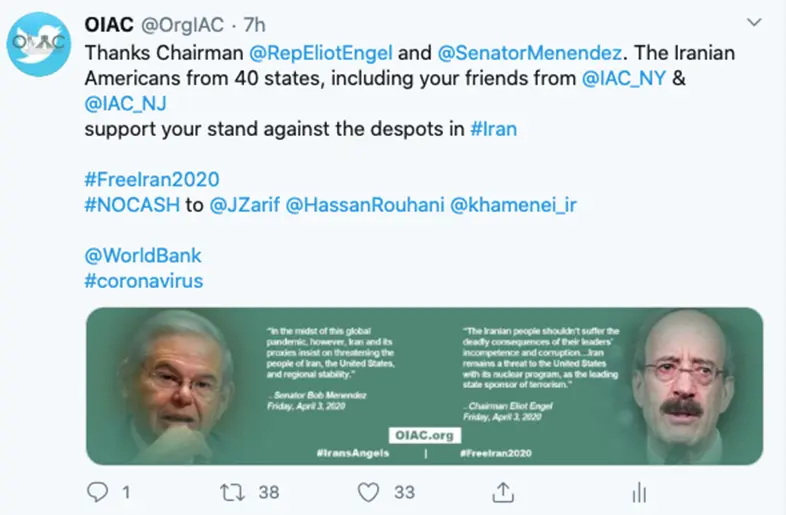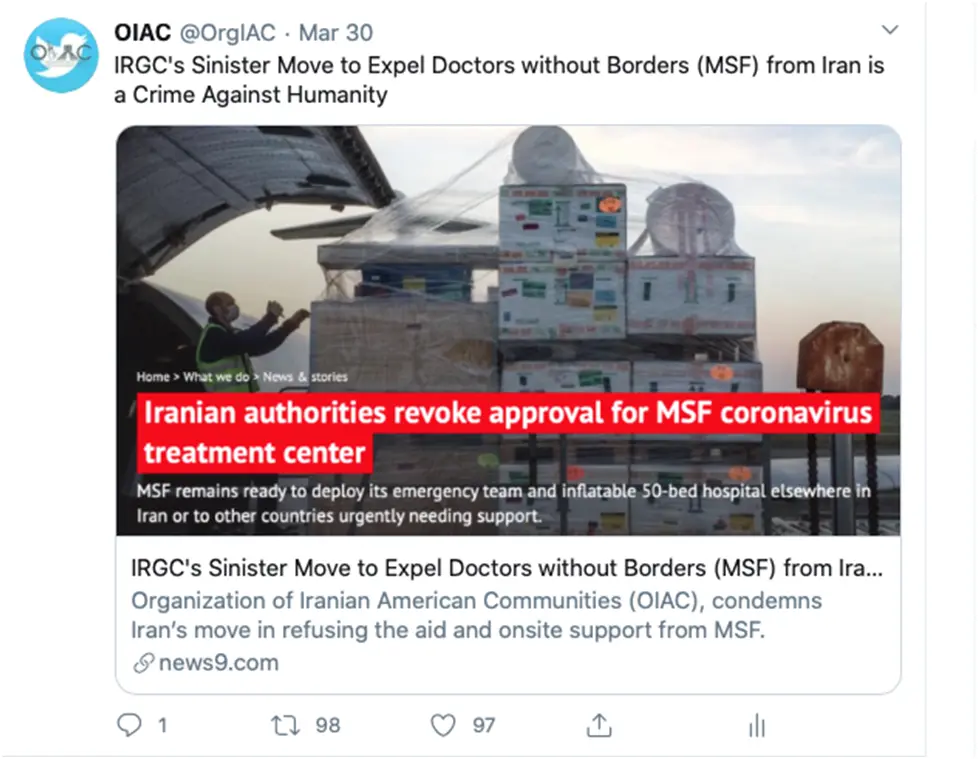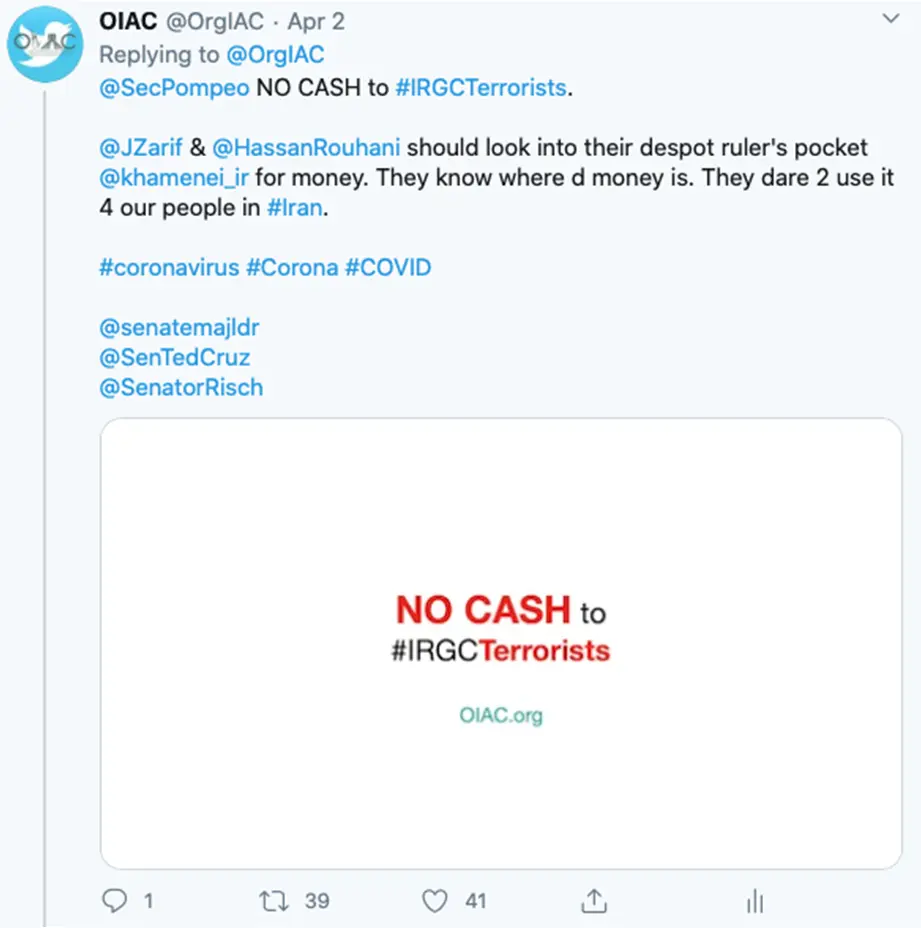166 prominent Iranian American medical professionals and health workers send a letter to President Donald Trump.
OIAC praises CFFI for their letter to President Donald Trump highlighting Iran’s sinister plan to leverage COVID-19 pandemic to enrich and empower the regime
WASHINGTON, DC, USA, April 12, 2020
Organization of Iranian American Communities (OIAC) praises Clinicians for a Free Iran (CFFI) for their letter to President Donald Trump highlighting Iran’s sinister plan to leverage COVID-19 pandemic to enrich and empower the regime. More than 160 prominent medical professionals, health workers, and scholars, many of whom are on the frontline of the battle against this global pandemic, have raised deep concerns that regime foreign minister Javad Zarif is portraying his regime as a “victim ” of U.S. sanctions.
CFFI Chair, Dr. Ashraf Zadshir, a specialist in infectious diseases and Founding Director of the Department of Residency at Borrego Health in Southern California added that, “both the Supreme Leader, Ali Khamenei, and President Hassan Rouhani should be held accountable for expelling Doctors Without Borders team from Iran and refusing U.S. offers of humanitarian assistance, the regime is blaming the pandemic on the U.S. sanctions to cover up its denial, mismanagement, and subsequent embezzlement of COVID-19 aid sent by the international community.”
According to CFFI President, Dr. Firouz Daneshgari, a senior surgeon at the Case Western Reserve University and the honorary president of the International Medical Committee, “the Iranian regime is campaigning, not to help the people of Iran, but to exploit the loss of thousands of Iranian lives due to COVID-19 for its sinister agenda, to get the sanctions lifted by the United States and the International community.“ The CFFI letter reiterates a number of important facts also outlined in a joint statement by Senator Bob Menendez (D-NJ), Ranking Member of the Senate Committee on Foreign Relations, and Representative Eliot L. Engel (D-N.Y.), Chairman of the House Committee on Foreign Affairs. In the letter, these lawmakers correctly charged that Iranian regime, “has diverted medical equipment, declined U.S. and other assistance, and continued to support dangerous terrorists around the world even in the midst of this crisis.”
OIAC concurs with the CFFI that, “The much-needed humanitarian aid should only be provided directly to the people of Iran and not the regime and its IRGC, and Tehran must be compelled to accept such humanitarian aid.” We further join the CFFI signatories in asking U.S. government, “to maintain the maximum pressure on the regime while offering direct aid to the people of Iran.”
April 10, 2020
The Honorable Donald J. Trump
President of the United States
1600 Pennsylvania Avenue, NW
Washington, D.C. 20500
Dear Mr. President,
We write to you as Iranian-American medical professionals and scholars whose families and loved ones are facing the threat of the coronavirus pandemic in Iran. While many of us have been away from Iran due to the political repression and lack of freedom, we are watching the current events there with broken hearts and sorrow, as the death toll rises daily due to the utter mismanagement, systematic corruption and lack of transparency of the ruling mullahs. The Wall Street Journal quoted a World Health Organization official as saying that “the death toll could be five times higher than official reports suggest.”
Medical supplies to deal with the coronavirus have been largely monopolized by the Islamic Revolutionary Guard Corps (IRGC), which makes huge profits from them. In a letter to the Minister of Industry, Saeed Namaki, the Iranian regime’s Health Minister, wrote in early March, “The problem of health masks is still not resolved; an interconnected network is hoarding masks and selling them at ten times the price.”
Tehran has also been sending masks to its proxies in the region. On March 24th, the spokesperson of the French Foreign Ministry said “the majority” of French aid delivered to Iran had been immediately transferred to Iraq and Lebanon by the Iranian authorities.
After expelling a Doctors Without Borders team from Iran and rejecting U.S. offers of humanitarian assistance, the regime is blaming the disaster on U.S. sanctions to cover up its denial, mismanagement, and subsequent embezzlement of COVID-19 aid sent by the international community. These efforts are coordinated at the highest levels, i.e., the Supreme Leader Ali Khamenei and President Hassan Rouhani.
Foreign Minister Javad Zarif portrays Iran as a “victim” of U.S. sanctions, despite the State Department’s emphasis that America “maintains broad authorizations that allow for the sale of food, agricultural commodities, medicine, and medical devices by U.S persons or from the United States to Iran.”
The fact is, the Supreme Leader and the IRGC control over a dozen giant foundations and hedge funds worth hundreds of billions of dollars. The National Development Fund of Iran has over 40 billion dollars in assets. Yet not a single dollar of these assets has been spent to deal with the coronavirus crisis.
Sadly, many of our colleagues and peers have also lost their lives because the regime hoards, hides, or denies healthcare professionals the protective gear and basic necessities they so desperately need. There is indeed a humanitarian crisis in Iran, caused by Khamenei and his entire regime.
Unfortunately, the Iranian regime is waging a campaign, not to help the people of Iran, but to exploit the loss of thousands of Iranian lives due to COVID-19 for its sinister agenda, to get the sanctions lifted by the United States and the international community. We believe the much-needed humanitarian aid should only be provided directly to the people of Iran, and not the regime and its IRGC, and Tehran must be compelled to accept such humanitarian aid.
The coronavirus crisis once again showed the Iranian people that this regime is their number one enemy, and they will see prosperity, justice, and freedom only after the rule of this regime is ended. It is very important for the United States to deny the IRGC and clerical leaders any assistance or relief, which would only prolong the rule of the mullahs and the suffering of the Iranian people. Now is the time to maintain the maximum pressure on the regime while offering direct aid to the people of Iran.
Respectfully,
Ashraf Zadshir, M.D., AAFP Firouz Daneshgari, M.D.
Chairperson President
cc:
The Honorable Mike Pence, Vice President
The Honorable Nancy Pelosi, Speaker of the House
The Honorable Mike Pompeo, Secretary of State
The Honorable Steven Mnuchin, Secretary of Treasury
The Honorable Mitch McConnel, Senate Majority Leader
Engel & Menendez Propose Policies for Addressing COVID-19 in Iran
Washington—Representative Eliot L. Engel, Chairman of the House Committee on Foreign Affairs, and Senator Bob Menendez, Ranking Member of the Senate Committee on Foreign Relations, today proposed a series of policies addressing one key part of the global COVID-19 outbreak. The lawmakers’ proposals would help ensure humanitarian assistance will be able to flow to Iranian citizens who need it most, while seeking to avoid enriching and empowering the dangerous regime.
“Iran has become one of the countries hardest hit by the novel coronavirus, and the tragedy there is growing by the day. The Iranian regime, however, has diverted medical equipment, declined U.S. and other assistance, and continued to support dangerous terrorists around the world even in the midst of this crisis. The Iranian people shouldn’t suffer the deadly consequences of their leaders’ incompetence and corruption,” said Chairman Engel. “Iran remains a threat to the United States with its nuclear program, as the leading state sponsor of terrorism, and by backing groups attacking American personnel in the region, and we will not relax efforts to confront these malign policies. But we also have a shared obligation to combat this deadly pandemic and to help people who are suffering wherever they are.”
“The Iranian people have suffered for decades under the Iranian regime’s oppression, resource mismanagement, and dangerous propaganda—all of which has been exacerbated by the COVID-19 crisis,” said Ranking Member Menendez. “In the midst of this global pandemic, however, Iran and its proxies insist on threatening the people of Iran, the United States, and regional stability. The United States has imposed sanctions on Iran for its nefarious nuclear weapons development, support for terrorism and human rights abuses. There is no evidence that the regime has stopped its sanctionable behavior. Moreover, simply lifting sanctions that have been imposed for ongoing malign behavior will not provide immediate or meaningful relief for the Iranian people. Congress has made clear through legislation that our sanctions regime should never hinder humanitarian and medical relief. To that end, the Trump Administration has a number of technical and public diplomacy tools it should use to ensure that the United States does not contribute to the Iranian regime’s cruelty of preventing humanitarian relief from reaching those most in need.”
The United States has taken steps in recent weeks to help the Iranian people in their fight against COVID-19. On February 27th, the Treasury Department granted broad authority to allow humanitarian transactions with the Central Bank of Iran. On March 6th, the Treasury Department posted a new FAQ on their website with respect to humanitarian transactions. At the same time, the Administration’s rhetoric has been chilling to those who want to participate in humanitarian relief in Iran.
Today, Chairman Engel and Ranking Member Menendez proposed that the Trump Administration take the following additional policy steps:
- Publicly clarify that U.S. law does not penalize medical or humanitarian transactions meant to fight the COVID-19 pandemic and publicly promote ways that financial institutions and governments around the world can help fight the pandemic in Iran.
- Address banks’ reluctance to finance sales of medical goods to Iran even though these transactions are exempt from U.S. sanctions. Without such “bank derisking,” Iran’s ability to import medical items is unnecessarily hampered.
- Work quickly with other governments to set up humanitarian channels for companies to provide COVID-19 related assistance to Iran, modeled on the existing Swiss humanitarian channel. Companies should not be penalized or sanctioned if they are legitimately providing humanitarian or medical supplies which will help the Iranian people combat the spread and effects of COVID-19 in that country.
- Temporarily raise the ceiling on the amount of funds permitted to be sent to Iran for humanitarian aid under General License Eor specify that COVID-related payments are not counted under that cap.
Additionally, fighting this pandemic will require all of us to commit to global humanitarian relief. The government of Iran should take immediate steps to promote the health and safety of those in Iran by:
- Releasing all politically-held dual nationals from prison who may be at increased risk for contracting COVID-19.
- Accepting U.S. offers of assistance to support the Iranian people.
https://foreignaffairs.house.gov/2020/4/engel-menendez-propose-policies-for-addressing-covid-19-in-iran
New York, March 24, 2020—The international medical humanitarian organization Doctors Without Borders/Médecins Sans Frontières (MSF) is shocked by the statement made today by officials of the Iranian Ministry of Health (MoH) revoking its previous approval for MSF’s intervention to manage severe COVID-19 cases in Isfahan. MoH officials declared today that the country does not need additional treatment capacity for the management of severe cases.
“We are deeply surprised to learn that the approval for the deployment of our treatment unit has been revoked,” said Michel Olivier Lacharité, manager of MSF’s emergency programs, who is based in Paris. “The need for this intervention, and the authorizations needed to start it, were discussed and agreed with relevant Iranian authorities during the past weeks. Our teams were ready to start medical activities at the end of this week.”
Two cargo planes chartered by MSF, containing the materials needed to build a 50-bed inflatable treatment unit, landed in Tehran on Sunday and Monday, March 22 and 23. MSF also sent a nine-person international emergency team, including two intensive care unit (ICU) specialists, who were welcomed by the local health authorities when they arrived in Isfahan. The site allocated for the treatment unit within the grounds of Amin Hospital had already been prepared—the most time-consuming part of set up that involves leveling and preparing the ground and connecting to water and electricity.
MSF remains ready to re-deploy its emergency team and treatment unit elsewhere in Iran or to move them to other countries in the region, where support to address the massive needs caused by the coronavirus outbreak is urgently needed.
MSF is an international medical humanitarian organization running activities in over 70 countries. For its work in Iran, MSF does not receive funding from any government and relies solely on private donations

The renowned international non-governmental group, Medecins Sans Frontieres (MSF) or Doctors Without Borders sent a consignment of medical aid to Iran, including one field inflatable hospital, medicines, respiratory masks, and protective clothing. Recognizing how bad Iran has been hit with COVID-19, MSF also sent a 50-bed inflatable hospital and a 9-person emergency team to Isfahan which is the second most affected province in Iran. Within hours, the Islamic Revolutionary Guard Corps (IRGC), designated as a terrorist organization by the United States, acted on the order of Iran’s Supreme leader and called for halting of such a vital mission to help critically ill patients in Iran.
Organization of Iranian American Communities (OIAC), condemns Iran’s move in refusing the aid and onsite support from MSF. The world community must hold the Supreme Leader, Ali Khamenei, Iran’s President, Hassan Rouhani accountable for their crimes against the people of Iran and the global health. For the record, Iran holds the highest number of coronavirus in the world. According to data collected by the National Council of Resistance of Iran, to date, there have been more than 10,500 deaths across 219 cities and towns in Iran.
While the death toll rises in Iran, the regime rejects US humanitarian aid, expels MSF and misappropriated some $1 billion in international aid intended to help ordinary citizens in recent days. Lack of transparency, accountability, supporting the needs of the affected population and refusal to employ best practices such as quarantining hard-hit areas are not just a threat to the people of Iran but the global health.
The sinister regime of Mullahs is working hard to reshape the narratives on the COVID-19 pandemic and portrays as a biological attack that is exacerbated with sanctions. For the record:
1. With the continued hiding of the truth on the COVID-19 death toll in Iran, the international community is operating with missing critical data to combat this global pandemic. For the sake of global health, the United Nations, must hold Iran accountable for lack of transparency and condemn its continued efforts to hide the truth. Examination of mass graves across Iran in recent weeks demonstrates the depth of the tragedy in Iran.
2. The disinformation campaign led by Ali Khamenei, Hassan Rouhani, IRGC, and Javad Zarif is deliberate, purposeful, and shortsighted in order to shift the blame to others. The world community must be diligent and use the example of halting MSF vital mission as a lens to examine the regime’s intentions. Mullahs are looking for cash to fund their malign activities and terrorism. Further financial aid to this regime will be used against the people of Iran, global peace and health.
3. For the sake of Iranian people, the World Health Organization and all relevant international bodies must step in to ensure medical aid is reaching the health professionals and the patients in this time of crisis.
4. For the sake of combating terrorism and preventing further info-terrorism on the COVID-19 pandemic in Iran, the United States should add Iran’s Ministry of Intelligence and Security (MOIS) and all its related lobbying entities to the Foreign Terrorist Organizations list.







